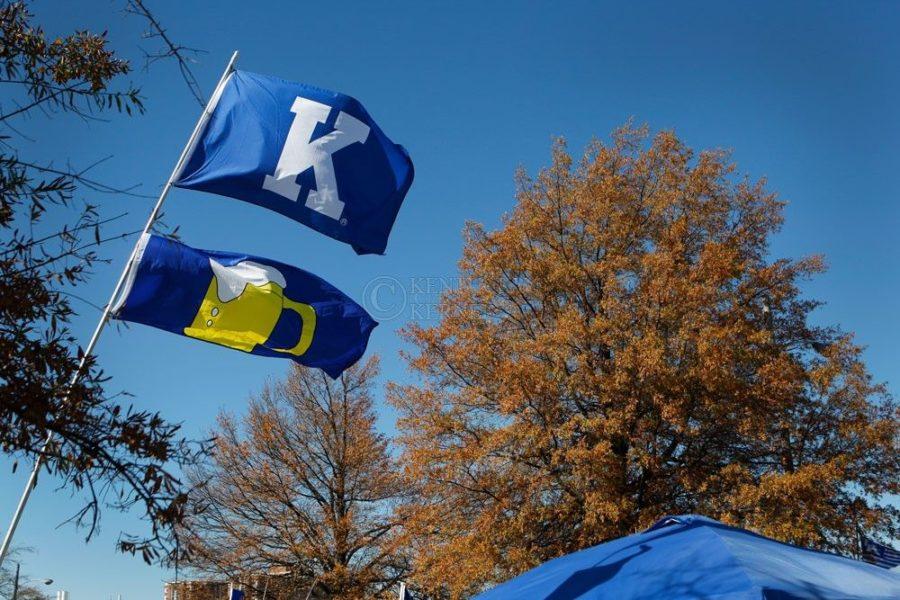UK revisiting ‘dry’ campus alcohol policy
January 31, 2013
By Taylor Moak | @KernelMoak
UK is revisiting its alcohol policy after discussions with campus and community members about the effects the policy has on and off campus.
President Eli Capilouto will make a recommendation to the Board of Trustees this fall on what the future of the policy should be, UK spokesman Jay Blanton said.
Robert Mock, vice president for student affairs, said many groups, including city and campus officials, and the community are involved in the discussions about the policy and “those groups are not always on the same side.”
UK’s campus has been designated “dry” since 1988, but Mock said it would be disingenuous to say that UK is completely dry. He said “not wet” is a more accurate description.
“There are no dry campuses,” he said, because having a policy in place does not ensure that it is followed.
Under the current policy, UK prohibits the use, serving and sale of alcohol on campus property and at university events, except at a few locations, such as the Boone Faculty Center, suites and leased spaces at Commonwealth Stadium and in the Main Building.
Mock said the labels used to describe college campuses — wet, moist and dry — fall on a long continuum.
Mock came to UK from the University of Arkansas, which is a wet campus.
He said he is comfortable with Arkansas being a wet campus, just as he is comfortable with UK as a dry campus.
He said that he could “have it either way,” but the decision depends on the school because each institution has different culture and traditions.
No matter the recommendation that is made, Mock said it would take years for UK to adjust to what the new normal could be.
Before the change in 1988, UK had an unwritten policy that banned alcohol in residence halls but allowed it in fraternity houses if members were 21 or older.
But the adopted policy was the first formal statement by the university banning alcohol in residence halls, even for those 21 and older.
Fraternity house policies were then up to the individual organizations until an additional policy was passed in 1998 that banned alcohol use there.
Diane Lawless, Lexington’s 3rd District councilwoman, said the decision to take alcohol off campus created a less than ideal situation for UK and the Lexington community.
“I think having alcohol on campus is much safer than the way it is now,” she said.
By not allowing alcohol on campus, the university has no oversight, Lawless said.
When alcohol was on campus, students and UK had a “safety net,” she said, and the university could intervene if students were developing problems with alcohol.
Once the university changed its policy to prohibit alcohol, some students moved off campus to create party houses, she said.
The resulting situation is dangerous for students and the community, Lawless said, and a tension exists in the neighborhoods because a small number of students create a bad name for university students as a whole.
In 1998, UK changed its alcohol policy to include fraternity and sorority houses.
At the time, community members expressed concerns over what the change in policy would mean for surrounding areas.
“UK did not want to take the responsibility for the students,” said a 1998 resident in a letter published in the Lexington Herald-Leader. “Instead, the problem has been placed in the lap of Lexington homeowners.”
Lawless said she is “absolutely” for a change in the policy that would allow alcohol back on campus.
“Let’s face it, students are going to drink,” she said.
UK is in the process of updating its master plan, and university officials have heard from community members who want the university to re-examine its existing alcohol policy, Blanton said in an email to the Kernel.
Concerns have been expressed on all sides of the issue, Blanton said.
Some think a no-alcohol policy is the best approach, while others have suggested that the university change the existing policy out of concerns about the impact off-campus drinking has on neighborhoods.
“President Capilouto believes he has a responsibility to examine the issue in all its complexity and, ultimately, make a recommendation to our Board of Trustees this fall about any changes, if any, in the policy,” Blanton said.
UK is not alone in re-examining its policy, he said. A number of institutions in recent years have tried to find the right balance between student and community safety and the way the university acts as a neighbor to surrounding areas.
Lexington Mayor Jim Gray has been involved in the discussions with Capilouto about UK policies that affect the neighborhoods surrounding campus, including its alcohol policy, said Susan Straub, the mayor’s spokeswoman.
Straub said the mayor is interested in the update of the university’s master plan, and that the mayor and Capilouto have an ongoing conversation about “town and gown” relationships.
“And that policy is a part of that,” she said.
Student Government President Stephen Bilas said he has gone back and forth on his feelings about UK’s alcohol policy during his time as a student at UK.
He said he thought the university should explore alternatives, but he is not saying the university should commit to either being a wet, moist or dry campus.
“It’s a lot more complicated than that,” he said.
































































































































































